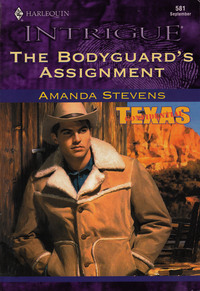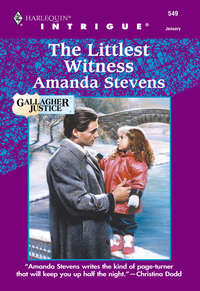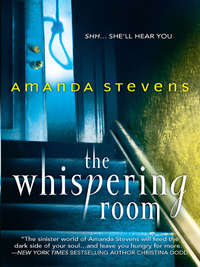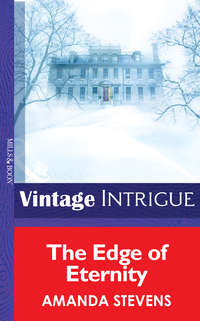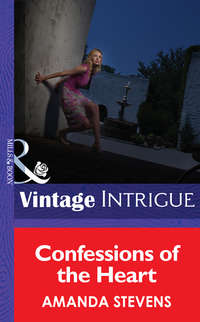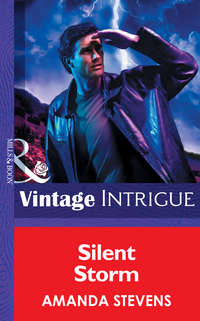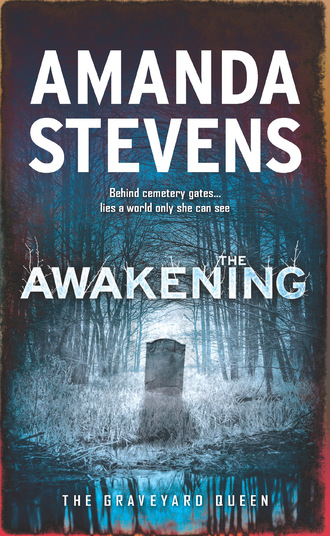
Полная версия
The Awakening
I awakened before I hit the bottom, my heart pounding. For a moment I could have sworn I saw the dead child’s face hovering over me in the dark, but nothing was there, ghost or otherwise. The night was calm and my dog, Angus, slept peacefully in his bed beneath the window. If he’d sensed an intruder, living or dead, he would have alerted me.
Clutching Rose’s key to my breast, I settled back against the pillow. It had only been a dream. I was safe and sound in my own bed, protected from ghosts by the hallowed ground on which the house had been built, and from living intruders by the alarm system I’d recently installed. I was safe. Nothing could get to me here.
Yet my heart wouldn’t be still. I checked the time on my phone, noting that it was straight-up midnight. I turned on my side and nestled under the covers, exhausted from the day’s work but too unnerved to doze back off. No point in trying to analyze or dissect the disturbing visions. Likely, they didn’t mean anything. But I couldn’t bring myself to believe that. Dreams were often portents, and I couldn’t forget Mama and Aunt Lynrose gazing down into that open grave or Prosper Lamb’s warning that the ghost was a bad seed. I didn’t believe that, either. A child wasn’t inherently evil. Something must have happened in her short life to cause all that pent-up rage.
Outside I could hear the wind in the trees as I lay there sorting through my churning thoughts. I rolled restlessly onto my back and watched shadows flail across the ceiling as the chimes in the back garden jangled. I listened intently to that distant sound, dread seeping down into my bones. The discordant notes melded into a distinctive melody, one that I had heard in Woodbine Cemetery that very day.
I tried to ignore the haunting descant, drawing the quilt up over my ears. I wouldn’t get up from my warm bed to go explore. I would not. It was the wind stirring the chimes and nothing more. But the melancholy strands floated through the house, luring me from under the covers and down the hallway to my office. I stood on bare feet at one of the long windows, arms hugging my waist as I peered out into the nocturnal landscape. I’d had security lights installed along with the alarm system and now I could peer into almost every corner. I trailed my gaze along the snowy beds of sweet alyssum, through the camellias and up into the tea olives. The leaves fluttered in the breeze, but no one was about. Nothing was amiss.
Go back to bed, Amelia. Stop borrowing trouble.
But I couldn’t turn away from the window. I couldn’t turn my back on the night. Something was wrong. I could feel it with every fiber of my being.
As I stood watching the shadows, something crashed into the window directly in front of me. I stumbled back, hand to my heart. At first I thought it must be a night bird disoriented by the reflection of moonlight on glass, but I hadn’t seen so much as a darting shadow.
The sound came again and again. It was rhythmic and jarring, a steady bam, bam, bam that made me think of a ball being bounced against the window. And that made me think of the ball that had rolled to my feet in Woodbine Cemetery. Had the ghost child followed me home? Had she manifested in my garden? I couldn’t see her. I couldn’t yet feel her cold, but I sensed she was near.
The banging against the window increased, a hard, rapid volley that rattled the glass and set off my security alarm. Angus started barking and did not let up even when I hurried down the hall to deactivate the system. I returned to the window, my heart hammering a painful staccato as I stared out into the empty backyard. This was not a playful taunting; this was malevolent. I feared the ghost wouldn’t relent until the glass shattered into a million pieces.
“Please stop,” I pleaded.
Mercy, came the silent rejoinder.
“You’ll break the glass. You’ll hurt me.”
Mercy, the ghost demanded.
“Mercy,” I whispered.
The pounding stopped. Angus fell silent. The wind died away, leaving an unholy stillness in the garden.
Four
I awakened the next morning to the soothing sound of rain on my roof. I got up and dressed for the cemetery, but the deluge showed no sign of letting up. Work had always been my escape in times of stress and confusion, but today I felt a keen sense of relief that I could put off a return to Woodbine. The experience at my office window had left me unnerved. The ghost child wanted something from me and I hated to think what she might do next to get my attention.
But even apart from the dread I had of the apparition and her intentions, I had no desire to run into Prosper Lamb again. I had felt something in the caretaker’s presence—an indefinable foreshadowing—that worried me. I wasn’t comfortable with his proximity. I didn’t want him watching over me. I would have much preferred a solitary restoration, but I had no control over his comings and goings.
Trapped inside, I spent the morning catching up on bills and invoices, and that afternoon, I worked on my blog, Digging Graves. The crib monument had so intrigued me that I decided to write about the history of such headstones. The more I researched, the deeper my fascination became until the single blog post I’d originally envisioned turned into a series of articles I called “The Loneliest Graves: An Exploration of Symbolism and Traditions Associated with Infant Burials.”
Hours passed unnoticed as I became engrossed in my work. It was cozy in my office with the rain streaming down the windows and Angus curled up nearby. I sipped tea and contentedly typed away, stopping only when the drag of exhaustion called me to bed just before midnight.
Without any ominous dreams or ghostly interruptions, I slept the sleep of the dead and awakened to another rainy day. I returned to my writing, but by midmorning, I was starting to go a little stir-crazy. I drove down to Waterfront Park and then, grabbing my umbrella, exited the car for a soggy stroll along East Bay Street and the Battery. The weather had chased the tourists inside and I had the walkway to myself. I went all the way to the point of the peninsula and watched the waves for a few minutes before turning back.
The downpour shrouded the mansions along Battery Row, but even so, I stopped to admire them as I almost always did on my morning walks. The towering spectacles were a mixture of architectural styles representing the peak of Charleston’s grandeur. Like most of the old houses south of Broad Street, they had been passed down from generation to generation. The Devlin abode was one of the largest on East Bay, a shimmering white Renaissance Revival with three stories of columns and a rooftop pavilion from which the family’s ancestors had undoubtedly viewed the Battle of Fort Sumter in Charleston Harbor.
Once upon a time, I’d had a connection to that house, though I’d never been inside and had never met the current owner, Jonathan Devlin. Until a year ago last spring, I’d had a relationship with his grandson, John Devlin, a former police detective who was the heir apparent to the Devlin home and to the family fortune. Our breakup had not been mutual and I’d spent the past eighteen months brooding about his reasons and motivations when I should have long since relegated him to a distant corner of my memory. But no matter what I did or where I went, I couldn’t seem to forget him. Scarcely a night went by I didn’t ache for him, that I didn’t dream about being back in his arms. Mornings were cold, cruel awakenings.
Not only had Devlin broken my heart, but he’d also returned to a life he once rejected. He’d resigned from the police department, taken control of the family’s holdings and, rumor had it, he’d moved back into his grandfather’s mansion. Sometimes in my weaker moments, I wondered if the reason he’d left was because I didn’t have an acceptable pedigree. I wasn’t a suitable match for someone who came from a world I could only gaze at from afar. The Devlin family was one of the oldest and wealthiest in the city. They had been here since the founding of Charleston over three hundred years ago. My people came from the mountains.
But that was too simplistic an explanation for our estrangement and didn’t take into account his family’s sinister connections—those dark alliances and shadowy associations, some of which were only now surfacing. It was hard enough to accept Devlin’s recent engagement, let alone the possibility that as a member of the secret and deadly Congé, he might now be my mortal enemy.
As I stared across the street, the base of my spine tingled. Little wonder, I told myself. For all I knew, Devlin might be inside at that very moment. Even the mere possibility of his nearness fluttered my heart. But it was more than that. Someone watched me.
My grip tightened around the umbrella as I searched the windows and balconies and the rain-soaked garden. I didn’t see anyone until I shifted my focus to the third floor and then my pulse jumped. Devlin stood in an open doorway, arms folded, one shoulder propped against the frame. The moment our gazes collided, he came out onto the balcony, leaning his forearms against the balustrade as he peered down at me.
I couldn’t help but shudder at his intensity. I knew the weight of that stare only too well. I had felt the singularity of his focus in anger and in passion. As I stood frozen, rain pattering against my umbrella, forbidden memories stirred to life—his husky drawl in the warm darkness...those obsidian eyes hard upon me as my legs locked around him...
I banished the images, reminding myself that Devlin was engaged now and some memories were best left buried. But even as I hardened my resolve, even as I tried to turn away from him, I could feel the pressure of his fingers around my arms, the feathery brush of his lips at my nape. It was as if he had come up behind me, coaxing me back against him as he wrapped me in a heated embrace. The sensation was so real and so powerful, I had the strongest urge to turn into him, to draw his face down to mine for a kiss. My hand lifted as if to touch him, but I quickly dropped it to my side and took a long breath to quiet my racing heart.
“Don’t,” I whispered.
He stared down at me for another long moment—almost defiantly, I thought—before he straightened and went back inside, leaving me alone and shivering in the rain.
* * *
I didn’t like wallowing in misery and self-pity, so I drove over to the Charleston Institute for Parapsychology Studies for a quick visit with my friend and mentor, Dr. Rupert Shaw. He and Papa were the only ones I could turn to in times of paranormal upheaval, but today I wanted his company as much as his advice.
Once we were settled in his cozy but perpetually cluttered office with cups of soothing chamomile before us, I told him about my new project at Woodbine Cemetery and my encounter with Prosper Lamb.
“Do you know anything about Woodbine?” I asked.
“Most of the cemeteries in that area are on the committee’s register of historic burial grounds,” he said absently as he sipped his tea.
“Yes, some of the graves are pre–Civil War. According to the caretaker, Woodbine has a rather sordid history.”
“Indeed?”
His response was so incurious I wondered if he’d heard me at all. Earlier when I’d called, he had seemed genuinely glad to hear from me, but now he appeared distracted and more than a little dispirited. He watched the rain through the garden doors with a brooding frown.
I set my teacup aside. “I have a feeling I’ve come at a bad time.”
He gave a dismissive wave. “Nonsense. You’re always welcome here. You know that.”
“Yes, but I shouldn’t take advantage of your good nature. I’ll go now and come back another day.”
“No, stay put, my dear. The rain has made me gloomy and reflective. Left to my own devices, I could easily become maudlin. Your company is a welcome diversion. No one can cheer me up the way you do.”
“Which is surprising, considering the things we normally discuss,” I teased. “We could talk about you for a change. I have the unfortunate tendency to dominate our conversations, but I am a good listener.”
“That’s a kind offer and I appreciate your concern, but I’m fine. I’d rather hear more about your work. What’s this about a sordid history?”
I nodded as I settled back against my chair. It was obvious he had something on his mind, but I wouldn’t press him. “It may be nothing more than gossip or an urban legend, but I’m intrigued by the caretaker’s claim of buried secrets. He says Woodbine is where the city’s well-to-do interred the people on the fringes of their lives. Mistresses, for example, and the children that came from those illicit unions.”
“Cemeteries are more your domain than mine,” Dr. Shaw said. “But I would never underestimate the decadence and callousness of the upper crust nor the extraordinary lengths they’ve gone to over the years to keep a stranglehold on their fortunes and legacies.” There was an uncharacteristic bitterness in his tone that made me wonder again about his despondency.
“Like forming the Order of the Coffin and the Claw,” I said. “And the Congé.”
“Any number of closed and exclusive societies—the latter, of course, being far more sinister than the former.”
I leaned forward, searching his careworn face and feeling faintly alarmed by the sallowness of his skin and the dark circles beneath his eyes. He had the look of a distraught man, but perhaps his mood really was attributable to the gloomy weather. Still, his attire seemed more threadbare than usual and his thick cap of white hair wasn’t as sleekly groomed as I’d come to expect. He had turned to the garden, watching the rain in glum fascination until I softly called him back.
He stirred and offered an apologetic smile. “I’m sorry, my dear. My mind keeps wandering but it has nothing to do with the company. You were saying?”
“I asked if you’d found out anything more about the Congé.”
“I’ve pulled back on my research. One of my sources became concerned that the inquiries had been noticed, and it seemed prudent to keep a low profile, at least for the time being. What I do know is that the Congé, with the exception of a very small and fervent faction, went dormant for a long period of time. As of late, there’s been resurgence. A powerful reawakening, I’m told. Old connections have been reestablished, while new members have been recruited. The Congé remain rooted in the occult, but they are also deeply embedded in the mainstream—business, government, finance. Like the Order of the Coffin and the Claw, they favor their own and eschew the unknown. Their primary motivation is to protect and maintain the status quo. But the Congé take it one step further. They fancy themselves kingmakers with a divine mandate. They use the fears and superstitions bred by these turbulent times to satiate their lust for power.”
“Who’s behind the resurgence?”
His mouth tightened as he set aside his teacup with a clatter. “My sources either don’t know or won’t say, but I wonder if Jonathan Devlin might not be at the heart of it all.”
I stared at him in shock. “Why would you think that?”
“It’s nothing more than speculation, but the Devlin name features prominently on the list I told you about weeks ago.”
“The membership list?”
He nodded as he twisted his pinkie ring, the snake-and-talon insignia all too familiar to me by now. “Think about what we know of their recruitment. They conscript from exclusive groups like the Order of the Coffin and the Claw, and there is no doubt whatsoever that the Devlins have had a long and intimate history with the Order.”
“As do you,” I pointed out. “You’ve never actually admitted your association, but you wear their emblem just as Devlin does.”
“You’re referring to my ring,” he said with a twinkle in his eyes. “I believe I once told you that I picked it up at a flea market.”
“That is what you said.”
“Even if I had once been affiliated with the Order, someone with my background and interests would never have been allowed into the exalted inner circle. And after my unseemly dismissal from Emerson University, I would have been further marginalized if not outright ostracized.”
“Is that what happened?”
He stared down at the ring. “If such a thing had happened, someone with my disposition, stripped of my reputation and power, might take a perverse pleasure in finding the venerated emblem at a lowly flea market. I might enjoy wearing said token, not out of vanity or misplaced loyalty, but as a poke in the eye at the elites. After all, they do like to keep their symbols unsullied.”
“I can see how that would be satisfying,” I said, not knowing whether or not I believed him. Claws were notoriously wily. “So the Congé recruits only from this exalted inner circle? Is that how they’ve remained under the radar for so long? Most of the Order wouldn’t even be aware of them then.”
“Correct. As I’ve said before, the elite chosen from the elite. The Devlin name carries the weight of aristocracy and tradition, perhaps more than any other of the old families. They’ve managed to remain virtually untainted through the generations, despite John’s marriage to Mariama Goodwine. My guess is, Jonathan Devlin knows he isn’t long for this world so he’s putting his affairs in order and cementing his legacy.”
“And he expects John to take over when he’s gone?”
“He is the grandson and heir apparent. The only other living Devlin so far as I know. That in itself adds cachet.”
Once the conversation turned to Devlin, I found myself back on the Battery staring up at that third-story balcony. The intensity of his stare lingered in the prickle at my nape and in the sudden thud of my heart.
“I’ve always been very fond of John,” Dr. Shaw said with a sigh. “I believe that, unlike his grandfather, he is at heart an honorable man. But if I’m allowed to speak plainly, the more distance you put between yourself and the Devlins, the better off you’ll be.”
“That is plainly spoken,” I said.
“I’ve never made any secret of my disdain for Jonathan Devlin. He is a cold, ruthless man who destroys anyone unfortunate enough to find themselves in his path.”
“That’s a very bold statement. I wasn’t aware you knew him that well.”
His gaze hardened. “We haven’t traveled in the same circle for years, but my opinion hasn’t changed. And if I’m right about his connection to the Congé, he is also very dangerous. As I said, you should stay far away from that family.”
“So it would seem,” I murmured, still taken aback by the sharpness in his tone. I’d never seen Dr. Shaw like this, even during the time he’d been under the influence of a diabolical assistant. He didn’t seem drugged or dazed today, but he was clearly preoccupied and not a little perturbed.
We both fell silent, lost in our own chaotic thoughts. Then Dr. Shaw let out another heavy sigh. “I’ve said enough about Jonathan Devlin. He is not a fit subject for such a gray day. We should get back to the subject of Woodbine.”
“Because a cemetery is such a cheerful topic,” I said with a smile.
“For us it is.”
“Yes.” I was happy enough to comply. For some reason, Dr. Shaw’s animosity toward Devlin’s grandfather made me uneasy, even though he was right to worry. Any member of the Congé, let alone the leader, could be lethal to someone like me and perhaps to Dr. Shaw, as well. “Here’s something that might interest you,” I said. “Woodbine has a ghost.”
Dr. Shaw lifted a snowy brow. “Only one?”
“I’ve seen just the one, though I have a feeling the cemetery is a very haunted place. All those buried secrets.” I shivered. “This ghost is the spirit of a little girl. And she appears to be a very angry entity.”
“Do you know why?”
“I don’t even know who she was. The only clue I have is an unnamed grave hidden within a copse of willow trees. The memorial is carved in the shape of a crib and the nameplate has only birth and death dates. The ghost seems to have a connection to this grave and I thought at first she was the spirit of the child buried there. But the infant died at the age of two and the ghost girl appears to have been ten or so when she passed.”
“Sisters?”
“That was my second thought. The ghost child came to my house last night and almost broke a window. I didn’t see her, but I sensed her out in the garden. She manifests with the smell of honeysuckle and a strange, haunting melody that I can sometimes hear in the wind chimes.”
“Intriguing.”
“Very. Before she appeared last night, I had a dream about her. The caretaker called her a bad seed.”
“Do you think that explains her anger?”
“No. Despite what I’ve read about an evil gene, I don’t believe children are born bad. Something happens in their life to turn them.”
“Or someone.”
Too late, I thought of his son, Ethan, a man with dark secrets and deadly tendencies. Ethan Shaw hadn’t been born evil and Dr. Shaw had certainly been a benevolent if somewhat absentminded role model. They had always seemed close. And yet Ethan Shaw had fallen prey to outside manipulations and his own misplaced affections until one day he had brought a gun to my house and shot Devlin in cold blood before he, himself, had been shot and killed.
I wondered if Dr. Shaw was also thinking about his son and if I should openly acknowledge the tender subject. Or should I pretend the awkward silence was only a lull in the conversation?
“Looking back, you think you can pinpoint exactly when they made the wrong turn,” he mused. “Where and why mistakes were made. And then years later you learn, quite unexpectedly, that you never really had a clue. Forces were at play you never saw coming.” He picked up a silver letter opener from his desk and absently fingered the edge.
“I—yes, that’s probably true.” I felt bad that he couldn’t open up to me in a more direct way. He had helped me through so many difficult times and he was obviously in the throes of rumination and regret. I wondered what had put him in such a state, the where and the why of his current deliberation.
Absently, he twisted the letter opener in his hand until the jewel in the handle caught the light. Something about his fixation chilled me. Then he rallied and gave me a tenuous smile. “Your ghost. Why do you think she tried to break your window?”
I shrugged. “She wants my attention. And like all the others, she needs my help.”
“Will you help her?”
“Do I ever really have a choice? I keep hoping she’ll just fade away. But they never have before.” Now it was I who sank into gloomy contemplation. “I think other forces may be at play here, too, Dr. Shaw. I don’t know how to explain it, but I’ve had moments of déjà vu lately. Callbacks to my past that I can’t help but think have meaning. I have this looming dread that something is coming to a head. Or to an end. The caretaker found a dead crow in the bed of the crib. He called it a corpse bird. He said it was a sign that someone else was about to pass.”
“Birds have been considered harbingers since the beginning of time. It’s true that a dead bird is often thought to be an omen, but like the death card in a tarot deck, it may not signify a literal passing.” Dr. Shaw observed me with kindly eyes. “It could be the death of something you’ve held on to for too long. An old relationship, for instance. Or the passing of an era. As with all things that end, the way then becomes clear for new opportunities. Perhaps a new destination.”
On the surface, his words seemed hopeful, but for me, they dropped like anvils and I felt a keen sense of loss for something that had yet to go missing. “I’m not sure that interpretation makes me feel a good deal better.”
“Letting go is a very hard thing,” he said. “Grief and guilt, even loneliness, can become a comfort. A touchstone. The road behind us, littered as it is with mistakes and heartache, can often be more appealing than the open road in front of us.”
“I hear what you’re saying and I don’t disagree, but in this case, I can’t help thinking the omen may have a more straightforward implication. I’ve been having strange dreams. Premonitions. The corpse bird can be interpreted literally, can’t it?”







